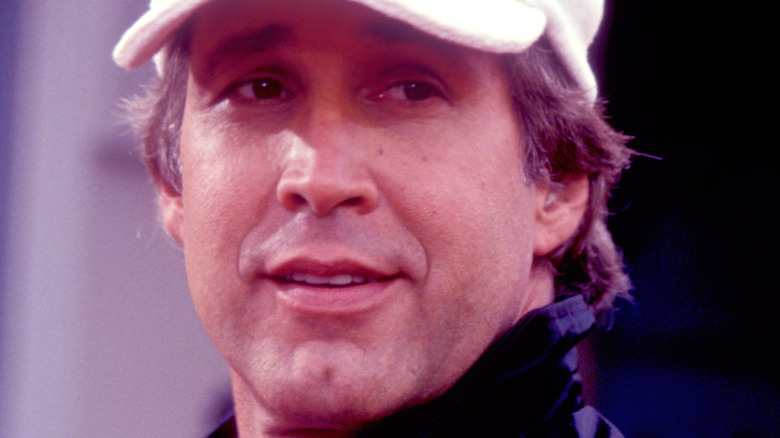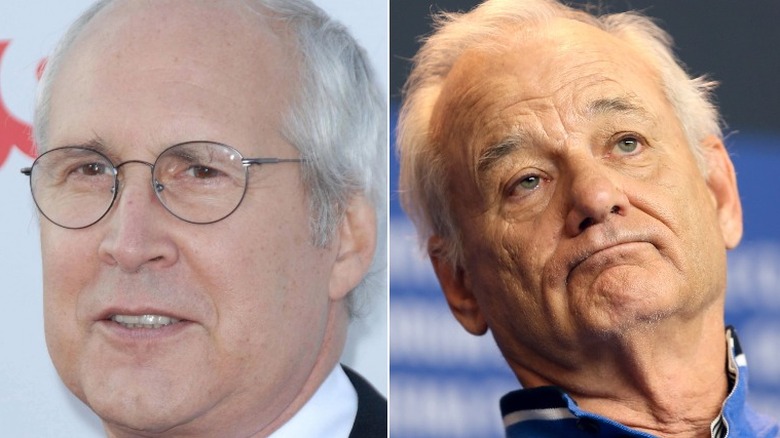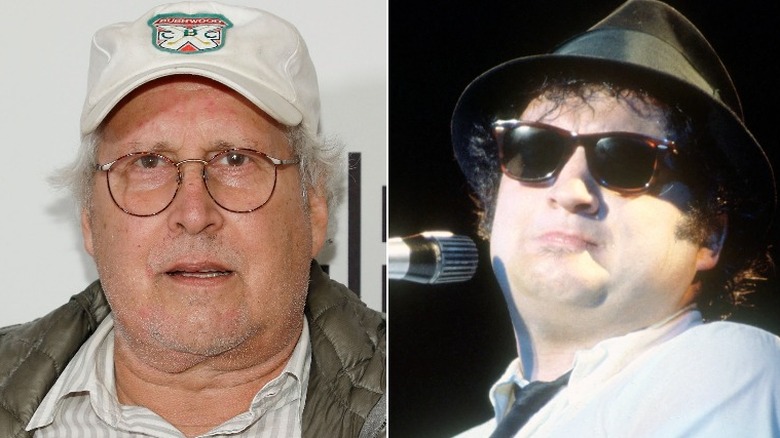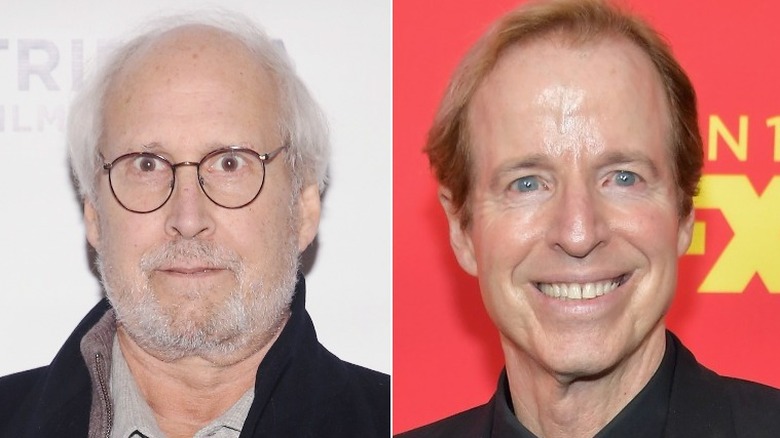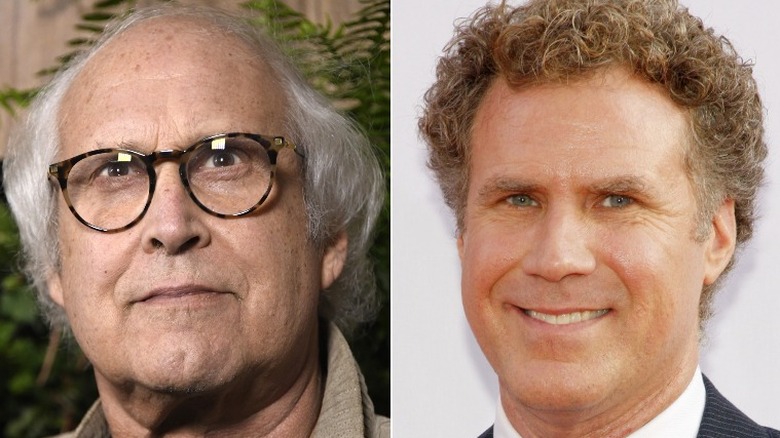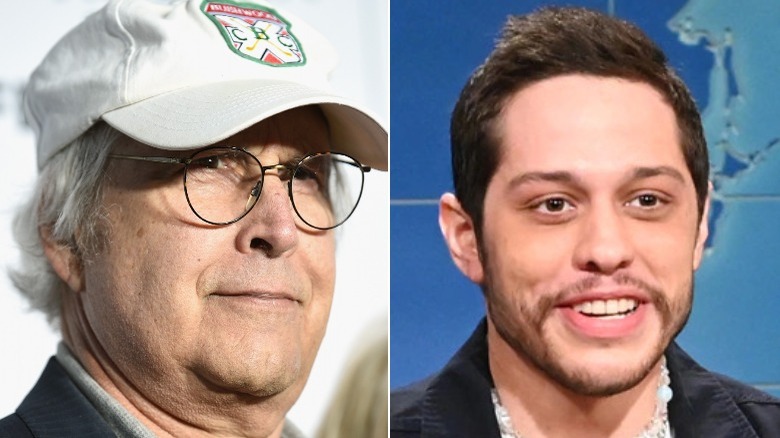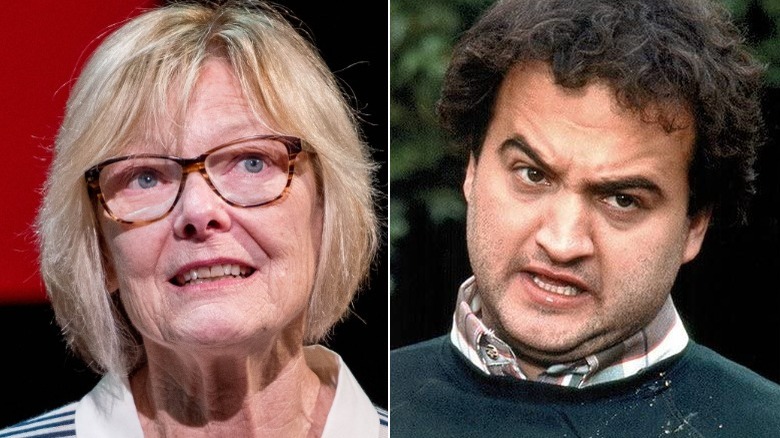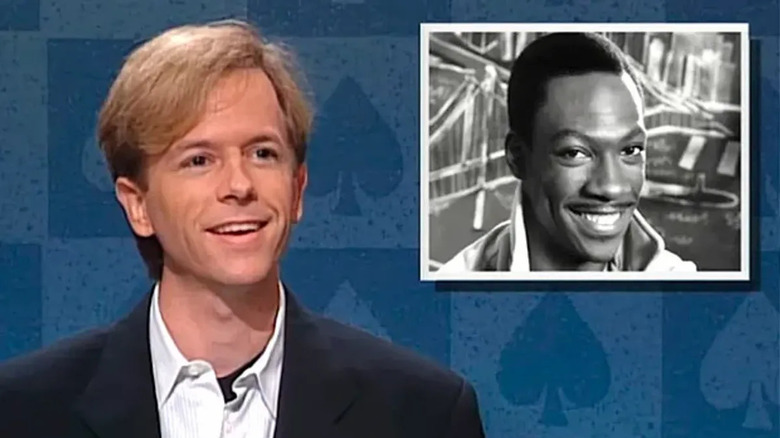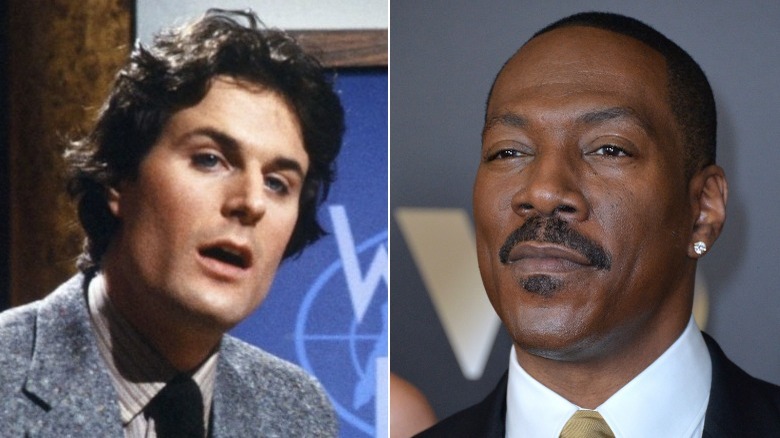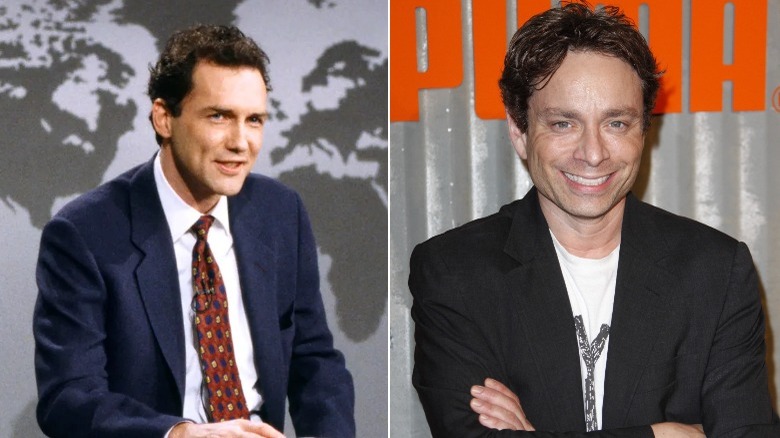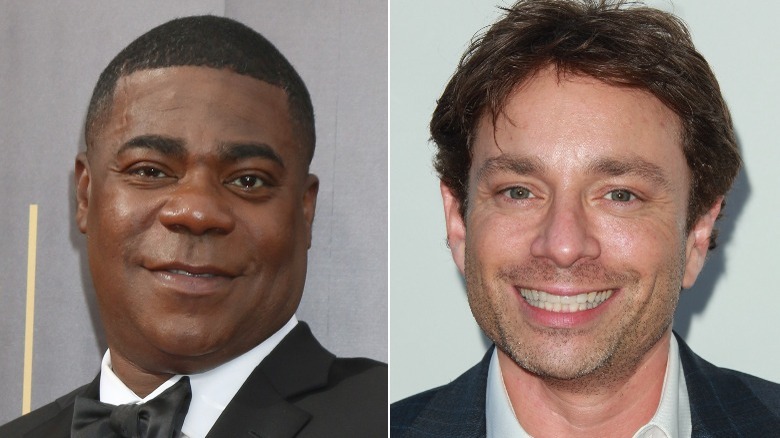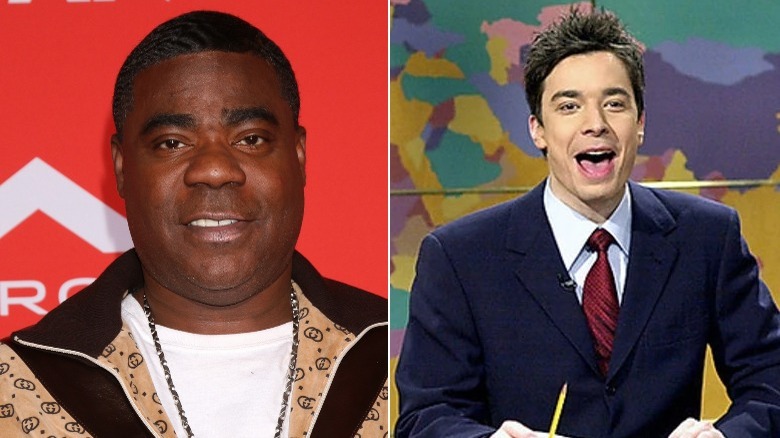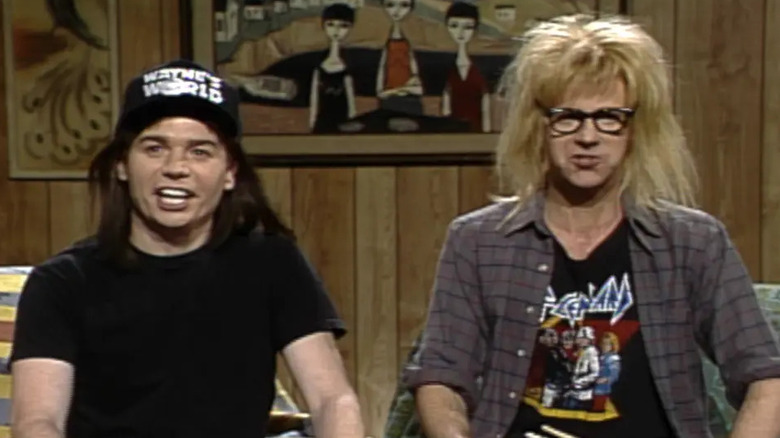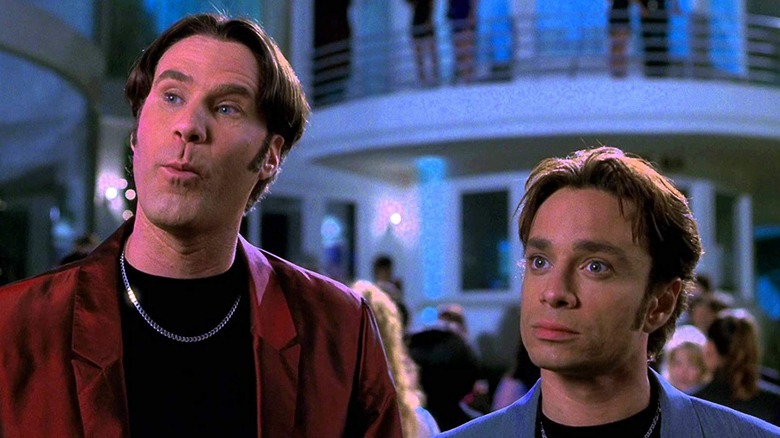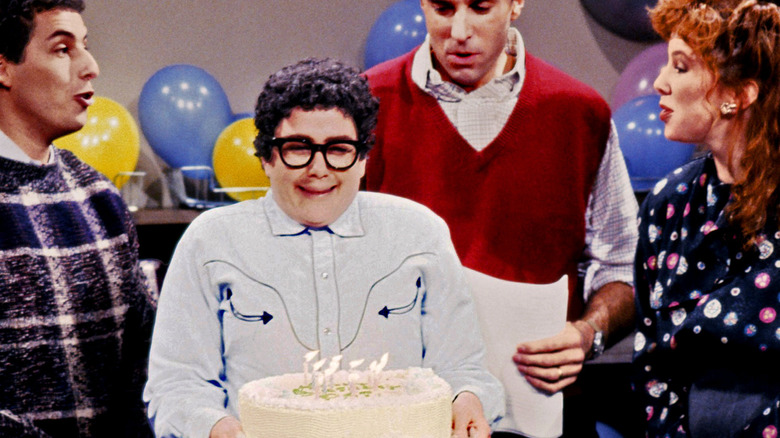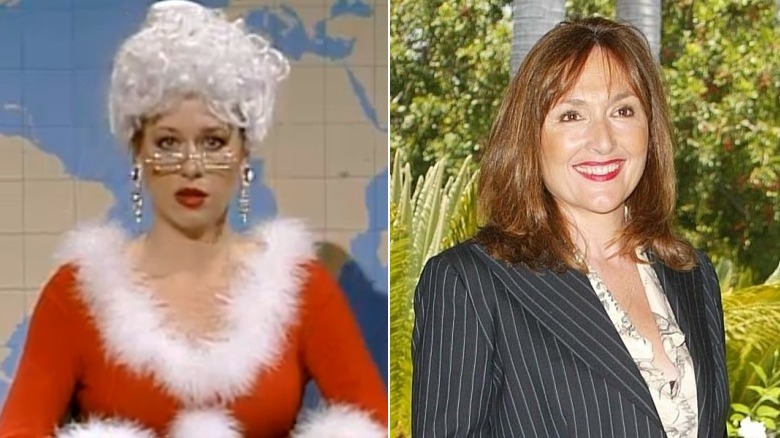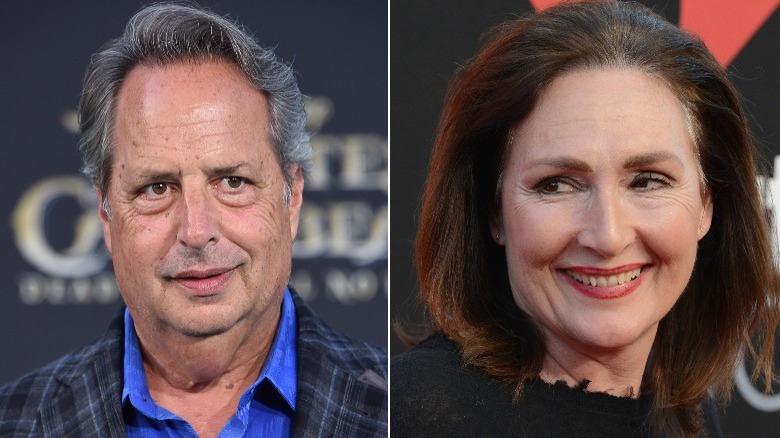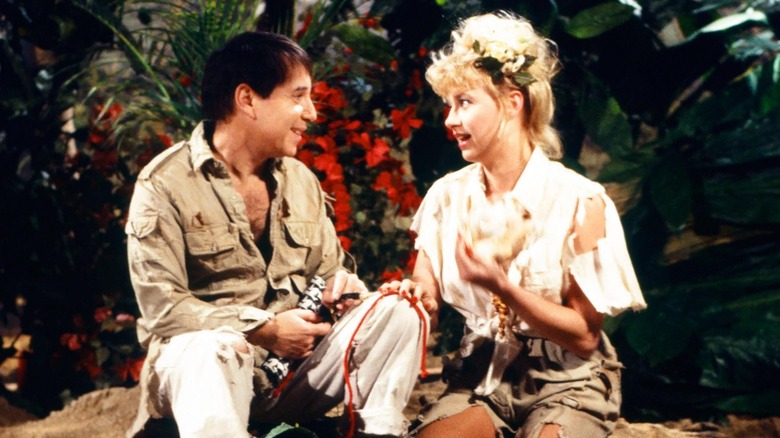SNL Cast Members Who Couldn't Stand Each Other In Real Life
"Saturday Night Live" is one of the most beloved comedy sketch series of all time. Having premiered in 1975, the show has consistently managed to entertain viewers across several decades, establishing dozens of talented comedians' careers over the years. But as popular as "SNL" continues to be in its newer seasons, the show is not immune to its share of problems, many of which stem from the clashing personalities of some of the series' most well-known cast members.
Considering how many comedians have walked through the doors of "SNL," inevitably, they're not all going to get along. Some of these feuds have become well known in the world of pop culture outside of "SNL," while other rivalries have been elaborated on by cast members in interviews, articles, or memoirs since their departures from the series.
Here are some of the heated and notorious rivalries we've seen or heard of that have taken place between "SNL" cast members, some of which got so personal that certain comedians still hold a grudge to this very day.
Chevy Chase and Bill Murray had an actual fight
Chevy Chase is a name that has been increasingly surrounded in controversy in recent years, owing to his allegedly poor treatment of everyone from Donald Glover on "Community" to director Chris Columbus on the set of "National Lampoon's Christmas Vacation." In fact, Chase has created such an infamously poor reputation for himself that he has been banned from hosting "Saturday Night Live" after several incidents involving his allegedly awful backstage behavior.
One of the most infamous of these incidents involved Chase and then-newcomer Bill Murray when Chase returned to host an episode of "SNL" in 1978. In Chase's account of the incident on "The Howard Stern Show," Murray had been fed supposedly false stories about Chase's onset behavior by cast member John Belushi. Chase told Stern that "Billy probably wanted to knock me down a couple of rungs" due to the considerable fame Chase secured after leaving "SNL." According to Biography, after Murray made a joke about Chase's marriage to Jacqueline Carlin, Chase quipped that Murray's acne-scarred face looked like a good spot for Neil Armstrong to land on. When Chase confronted Murray in Murray's dressing room after the argument, a physical fight broke out between the two. Luckily, they were separated quickly enough for Chase to get onstage and perform him monologue as scheduled.
Chase and Murray patched things up in later years, and the two both appear in the 1980 classic "Caddyshack." In an interview with Empire, Murray recalled, "It was really a Hollywood fight, a 'Don't touch my face!' kind of thing." Murray continued to explain, "We all felt mad he had left us, and somehow I was the anointed avenging angel, who had to speak for everyone. But Chevy and I are friends now. It's all fine."
Chevy Chase and John Belushi were rivals before SNL
Chevy Chase has had a number of feuds with "Saturday Night Live" cast members over the years. One of his earliest known rivalries, however, came before "SNL" ever aired, with a young Chase finding himself competing against the comedic talent of John Belushi.
According to Grunge, two years before the debut season of "SNL," Chase and Belushi co-starred in the off-Broadway stage production, "National Lampoon: Lemmings." Though Chase received some praise for his role in the show, it was Belushi who received the most critical acclaim from audiences. The success of the show helped launch the careers of both men, with Belushi later named creative director of the National Lampoon Radio Hour — a position he and Chase competed for fiercely. By the time Chase and Belushi found themselves cast on "SNL," they had entered into a love-hate relationship of sorts, frequently making personal insults at one another. In Doug Hill and Jeff Weingrad's "Saturday Night: A Backstage History of Saturday Night Live," the authors specifically say that the two "had a knack for goading each other."
As "SNL" found a welcome place among television audiences, Chase gradually gained more exposure due to his prominence on "Weekend Update," eventually becoming the series' first breakout cast member. Chase felt this made Belushi very envious, as he told Time magazine. As Chase's star power grew, he reportedly treated his fellow cast members progressively worse. Grantland notes that Chase once claimed to regularly shave Belushi's back and that he taught Belushi how to use a fork so that he could appear in "civilized company." The pair's relationship continued to deteriorate even after Chase left the series in 1976, with Chase accusing Belushi of making up rumors about him to future cast members and directly blaming him for his fight with Murray on "The Howard Stern Show."
Chevy Chase was allegedly horrible to several '80s SNL cast members
Along with Chevy Chase's physical fight with Bill Murray in 1978, one of the deciding factors that led to Chase's ban from "Saturday Night Live" was his negative treatment of the cast after his return to host the show in 1985. As Tom Shales and James Andrew Miller write in their book, "Live From New York: The Complete, Uncensored History of Saturday Night Live," Chevy Chase reportedly said to a young Robert Downey Jr., son of filmmaker Robert Downey Sr., "Didn't your father used to be a successful director? Whatever happened to him? Boy, he sure died, you know, he sure went to hell."
As bad as Chase's treatment of Downey was, it was nothing compared to his interactions with Terry Sweeney, the first openly gay member of the "SNL" cast. As Sweeney describes it, Chase regularly mocked Sweeney for his sexual orientation — a claim entirely supported by Jon Lovitz in The Huffington Post – with Sweeney describing Chase as a "monster" following their time working together. In "Live From New York," Sweeney specifically details an incident where Chase came up with a sketch idea that's so viciously homophobic and offensive, we've decided not to repeat it in this article. But if you need a general idea how cruel and vile this sketch idea was, keep in mind we were okay with publishing what Chase allegedly said to Robert Downey Jr. just now.
"It was just awful. He acted horribly to me. He acted horribly to everyone," Sweeney told the authors of "Live From New York." In that same book, Sweeney said that Chase's behavior at the time was so reprehensible, the cast actively tried to hide from him. "I don't know what he was on or what was happening to him mentally, but he was just crazy," said Sweeney.
Will Ferrell is not fond of Chevy Chase
Chevy Chase's negative reputation at "Saturday Night Live" only got more infamous with each new decade. When he returned to host "SNL" in 1997, cast and crew members working on the show found themselves sharing similarly tumultuous interactions with Chase, which indicates that the star of "Vegas Vacation" had learned nothing from his terrible mistakes. Tim Meadows commented that "When [Chase] was here, it was like just watching a car accident over and over again just watching him deal with people."
"He didn't care about what he said," Meadows went on to say. "He had no qualm about telling you you're an idiot." Chase's relationship with the 1990s era cast was so bad that Will Ferrell personally named him "easily" the worst host he'd ever worked with during his time on the show. Ferrell recounts in "Live From New York" a story where he witnessed Chase make a vulgar comment to a female writer that was so inappropriate and unfunny Ferrell stated, "In hindsight, I wish we'd all gotten up and walked out of the room."
The final straw reportedly came when Chase slapped Cheri Oteri in the back of the head, leading an irate Lorne Michaels to ban Chase from hosting ever again. Though Chase has occasionally appeared on "SNL" every now and then, Michaels has firmly upheld his decision and Chase has not hosted an episode since.
In later years, Chase named Ferrell as one of the reasons that — in his opinion — "SNL" had dropped in quality since the show's early days in the 1970s. In his interview with The Washington Post, Chase shared his negative take on the current state of "SNL" at length, mentioning that Ferrell in particular was "just not funny."
Pete Davidson is best friends with Chevy Chase ... just kidding
Chevy Chase hasn't shied away from making his thoughts clear on the more recent seasons of "Saturday Night Live." Chase told The Washington Post in 2018, "First of all, between you and me and a lamppost, jeez, I don't want to put down Lorne or the cast, but I'll just say, maybe off the record, I'm amazed that Lorne has gone so low. I had to watch a little of it, and I just couldn't f— believe it."
Shortly afterwards, Pete Davidson, then on his fourth year as an "SNL" cast member, responded to Chase's criticisms on "The Howard Stern Show." As reported by Variety, Davidson called Chase multiple colorful expletives, stating, "I hate that dude. He's just a genuinely bad, racist person, and I don't like him."
"What has he done since '83? Nothing," Davidson told Stern. "He had a really big career but then it stopped because everybody realized he's a j— off." Davidson also pushed back against Chase's comments on Lorne Michaels, which he viewed as extremely insulting to the famed "SNL" creator. "It's just disrespectful to Lorne too, a guy who gave you a career. No matter how big you get, you can't forget what that guy did for you," Davidson said.
In 2022, Chase responded to Davidson's rebukes as well as other people who have remained critical of his behavior, telling CBS This Morning, "I don't give a crap. I am who I am. And I like ... who I am. I don't care. And it's part of me that I don't care. And I've thought about that a lot. And I don't know what to tell you, man. I just don't care."
John Belushi's alleged sexism put him at odds with Jane Curtin
"Saturday Night Live" was a revolutionary series when it debuted in 1975, helping introduce a new era of comedians to American audiences while pioneering sketch comedy on late night television. Behind the scenes, however, the series didn't necessarily possess the most forward-thinking work environment for female performers. Jane Curtin, one of the original members of the Not Ready for Prime Time Players, discussed the sexism many female cast and crew members on the show faced during the early seasons of "SNL," claiming that John Belushi in particular tended to take a negative view of women working in comedy. "There were a few people that just out-and-out believe that women should not have been there and they believe that women were not innately funny," Curtin said on Watch What Happens Live With Andy Cohen, stating that Belushi belonged to this group.
Speaking on a panel with Oprah Winfrey, Curtin highlighted some of the struggles female writers had to endure when pitching new sketches to the cast, as well as the repeated hostility they encountered from Belushi. "Their battles were constant. They were working against John, who said women are just fundamentally not funny," said Curtin, according to The Huffington Post. "So you'd go to a table read, and if a woman writer had written a piece for John, he would not read it in his full voice. He felt as though it was his duty to sabotage pieces written by women." However, there was one notable exception to Belushi's sexism. As Curtin told Andy Cohen, Belushi did think fellow cast member Gilda Radner was exceptionally funny. Although, as Curtin puts it, "he didn't classify her as a woman. She was Gilda."
Eddie Murphy held a grudge against David Spade for years
Eddie Murphy is widely regarded as one of the most celebrated and significant cast members in "Saturday Night Live" history. Following his departure from "SNL," Murphy would go on to become a successful actor in Hollywood, headlining a number of movies in the early 1990s. By 1995, however, Murphy's momentum hit a minor slump with flops like "Vampire in Brooklyn." New "SNL" cast member David Spade poked fun at this slump in an installment of his weekly segment, "Spade in America." In the segment, Spade flashed a picture of Murphy and said, "Look children, it's a falling star, make a wish!"
In response to the joke, Spade told "Sway in the Morning" that Murphy called to give Spade a piece of his mind. Spade tried to avoid answering, only for Murphy to threaten to physically come down to the "SNL" offices if Spade didn't pick up the phone. When Murphy finally got ahold of Spade, he cursed him out, letting him know, "I'm off-limits to you. You wouldn't have a job if it wasn't for me. I made that place and kept it on the air."
Murphy would hold a grudge against Spade and "SNL" until 2011, when he told Rolling Stone magazine, "What really irritated me about it at the time was that it was a career shot. It was like, 'Hey, come on, man, it's one thing for you guys to do a joke about some movie of mine, but my career? I'm one of you guys.'" Since then, Spade told Jimmy Kimmel that he and Murphy have reconciled, with Murphy making to his return to the series in 2019 after a lengthy absence.
Charles Rocket was apparently jealous of Eddie Murphy
"Saturday Night Live" made quite an impact with its first few seasons, but things took a dramatic turn in the early 1980s. When Lorne Michaels announced he was stepping down from the show's production, most of the original cast and crew decided to part ways with "SNL" as well. With Michaels gone, NBC hired Jean Doumanian to take on Michaels' duties as the series' main producer and cast an entirely new roster to fill the shoes of the departing "SNL" players.
As the production of "SNL" Season 6 got underway, Doumanian hired a variety of performers to headline the show, including former news anchor Charles Rocket, who Doumanian saw as the most exciting new comic to join "SNL." According to Doug Hill and Jeff Weingrad's book, "Saturday Night: A Backstage History of Saturday Night Live," Doumanian saw Rocket as a mix between Chevy Chase and Bill Murray; someone capable of being the next "SNL" breakout star. However, Rocket's rise to prominence never came to be; meanwhile, young up-and-coming talent Eddie Murphy turned out to be the era's standout cast member.
Though Rocket was given a prominent place on "SNL" with his weekly "Rocket Report," audiences gravitated more towards Murphy, leading to Murphy's rapid rise in popularity. According to "Saturday Night," this led to a feud between Murphy and Rocket, who was reportedly angry and jealous that Murphy had earned the audience's favor and was reportedly openly hostile towards Murphy around the workplace. Following an incident where Rocket cursed live during a 1981 parody of "Dallas" and amid negative reception to the new cast, NBC replaced Doumanian with Ebersol, who dismissed Rocket along with most of the season's regular cast members — save for Murphy.
Norm MacDonald and Chris Kattan argued all the time
From the time he took over Weekend Update in 1994, Norm MacDonald regularly shocked viewers with his brash, subversive style of humor — something that famously got him fired from "Saturday Night Live" in 1997. Just as his jokes on Weekend Update could often come across as unapologetic or blunt, the same could be said of MacDonald himself, as demonstrated by his strange relationship with fellow cast member Chris Kattan.
When MacDonald and Kattan were featured in a 1997 Rolling Stone article, the two traded insults with one another. MacDonald went so far as to say he wasn't impressed by Kattan's talents as a comedian. "I don't find him funny. What can I say? Never made me laugh," said MacDonald. In 1999, The Observer quoted an anonymous source at "SNL" as saying, "They had a very acrimonious relationship. Norm would rip [Kattan] to his face. Norm's a weird guy. If he doesn't like someone, he'll say it to his face." Former cast member Jim Breuer has also mentioned to ABC that he recalls seeing arguments between Kattan and MacDonald break out, sometime moments before filming.
In 2015, more than a decade after both left the show, Kattan wrote on Twitter, "Norm MacDonald is one of the funniest guys I know and our SNL 'feud' was only for comedic purposes and was never anything other than satiric." MacDonald, who died in 2021, never again commented on his relationship with Kattan. Maybe he was just really committed to the bit?
Tracy Morgan had issues with Chris Kattan and Cheri Oteri
Tracy Morgan made his debut on "Saturday Night Live" in Season 22, joining the 1996 cast alongside Ana Gasteyer to replace the departing David Koechner and Nancy Carell. Though Morgan would find close friends waiting for him at "SNL" in the form of Will Ferrell, Colin Quinn, and Molly Shannon, he also found some cast members that apparently didn't favor his comedic style, namely Chris Kattan and Cheri Oteri.
In Morgan's 2009 memoir "I Am the New Black," he discussed in passing his feelings towards Kattan and Oteri, as well as what their backstage relationship was like on "SNL" in the late '90s. "I had my finger on the pulse of urban comedy, but when I brought my act to 'SNL,' those m— f— just felt bad for me," wrote Morgan. "All I have to say about that is, where's Chris Kattan now? Where's Cheri Oteri now?"
Morgan's antagonism towards Kattan and Oteri went even further when the "30 Rock" star recorded an audiobook version of "I Am the New Black," ad-libbing about which "SNL" cast members treated him well and which ones he felt were disrespectful. "[Kattan and Oteri] never treated me well," said Morgan, according to Gawker. "There were people that treated me beautifully, like Will Ferrell and Colin Quinn and Molly Shannon — I love them. But Cheri Oteri and Chris Kattan — I never cared for them either. F— 'em."
"I could remember those two, especially those two people, treating me like the invisible guy. Now look where they at," Morgan went on to say, according to NBC New York. "Cheri Oteri, she can't even get arrested."
Tracy Morgan hated Jimmy Fallon's habit of laughing on camera
Jimmy Fallon is well-known for his tendency to break down in laughter at a moment's notice; it happens all the time during his interviews on "The Tonight Show." However, this habit of Fallon's predates his late-night talk show career, as seen during his time on "Saturday Night Live" from 1998 to 2004.
Fallon himself has commented on his notorious inability to keep a straight face while performing on "SNL," telling GQ that neither he nor Lorne Michaels liked it when he broke character, but that audiences came to expect it. "At the end, it was like the audience was waiting," Fallon said. "The studio started to shake. Like an earthquake. I couldn't hold it in anymore. Torture." While some people might have enjoyed seeing Fallon barely keeping it together onscreen, Tracy Morgan was not a fan of Fallon's antics.
In a 2007 interview with Penthouse, Morgan stated his belief that Fallon laughing in the middle of a sketch not only ruined the scene, but also deliberately made him the center of attention. "That's taking all the attention off of everybody else and putting it on you, like, 'Oh, look at me, I'm the cute one,'" said Morgan. Earlier in the interview, Morgan said that he would warn Fallon not to laugh during their sketches together, saying that "[Fallon] wouldn't mess with me because I didn't f—ing play that s—."
As tense as Morgan and Fallon's exchanges may have been offscreen, it's worth pointing out that Morgan has since appeared as a guest opposite Fallon on "Late Night with Jimmy Fallon" and "The Tonight Show," so they seem to have gotten over their differences.
Dana Carvey was upset with Mike Myers for years
Mike Myers and Dana Carvey would have to be considered one of the most memorable comedic partnerships ever seen on "Saturday Night Live." Their "Wayne's World" segment remains one of the show's most recognizable ongoing skits decades after they both left the show. Though Myers and Carvey had undeniably great chemistry together, their offscreen friendship was a tad rocky at times.
Trouble began for the two when Myers embarked on his post-"SNL" career, turning his sights on adapting his original character, Austin Powers, for the big screen. Carvey's main complaint about the films is he thinks Dr. Evil is a little bit of a rip-off of his impersonation of Lorne Michaels, especially the distinct hand gestures. As Carvey told Howard Stern, he was the first "SNL" cast member to do an impersonation of Michaels. Carvey would extend his pinkie towards his mouth as though he was chewing on his nail, a character quirk that became the signature gesture of Dr. Evil. "When I saw Mike do it, I did kind of go, 'Hmmm...'" said Carvey in 2016.
Myers himself would also acknowledge the inspiration behind Dr. Evil's voice, as he told The Hollywood Reporter, "The Dr. Evil voice is a little bit Lorne Michaels, there are no two ways about it, but there is a lot more Donald Pleasence in there than Lorne. Lorne has a pinkie thing, but he doesn't do it anymore." It's worth pointing out that Myers' statement doesn't entirely gibe with Carvey's interview on "Howard Stern," where he claimed he was the one to think up the pinkie gesture, saying, "Lorne doesn't do [the pinkie thing], but somehow it fit." Though the two would remain somewhat distant for years — Carvey told Stern, "I talked about [the incident] with my therapist" — they have since reconnected and become close friends, according to Carvey.
Will Ferrell and Chris Kattan's friendship ended after an SNL film together
Mike Myers and Dana Carvey weren't the only comedic duo on "Saturday Night Live" to have a falling out. Chris Kattan and Will Ferrell, the two talents behind the '90s-era head-bobbing, club-going Roxbury Guys, faced a similarly unfortunate situation that resulted in Ferrell distancing himself from Kattan.
In Kattan's memoir, "Baby, Don't Hurt Me," he writes that the experience of making 1998's "A Night at The Roxbury" — a film adaptation of their Roxbury Guys sketch — put a heavy strain on their friendship. In his book, Kattan alleges that Lorne Michaels pressured Kattan into secretly pursuing a romantic relationship with producer Amy Heckerling, who Michaels was supposedly hoping would direct "Roxbury." After production wrapped and his affair with Heckerling concluded, Kattan noticed Ferrell stopped speaking to him.
When both comedians returned for "SNL" Season 24, Kattan confronted Ferrell, who allegedly told Kattan, "I got all your messages, but I didn't call you back because I didn't want to talk to you. I don't want to be your friend anymore. I'm going to be professional and still work with you on the show, but that's it." Ferrell never explained his decision to break off the friendship to Kattan, but Kattan wrote in his book that it was almost certainly due to his relationship with Heckerling.
Ferrell has never commented publicly on whatever happened with Kattan. A representative for "SNL" has denied that Michaels ever told Kattan to engage in a relationship with Heckerling. As for the "Clueless" and "Fast Times at Ridgemont High" director herself, Heckerling does not support Kattan's narrative of sordid events surrounding 1998's "A Night at the Roxbury."
"He's a nut," she said during an interview with The Daily Beast. "I don't comment about that, because basically I have no interest in helping his book sales. I don't even want to know or hear the dumb s—- he came up with."
Julia Sweeney felt she didn't fit in with SNL's male performers
"Saturday Night Live" had an unfortunate reputation for not being very welcoming for female performers during the show's 1970s heyday. While "SNL" gradually shifted gears to include more female comedians on the show, some female performers still felt that their voices weren't being included as predominantly as their male counterparts.
One of these performers was Julia Sweeney, an "SNL" cast member from 1990 to 1994, who ended her contract with the series early due to her frustrations with what she considered a "boys' club" environment at "SNL." "Everybody says the show is a boys' club, right?" Sweeney said in a 1994 interview with the Chicago Tribune. "Well, it's everything you think it is, times a hundred." As much as Sweeney enjoyed her time on the show, she felt neither she nor her comedic style was blending in well with the sensibilities of her male cast members. In a more recent interview with Salon, Sweeney said that she occasionally regrets her premature departure from the show while commending other female comedians like Amy Poehler for breaking through the male-dominated environment of "SNL."
However, she maintained that she wasn't used as extensively as the other talents, observing to Salon, "You could just watch how many more Adam Sandler and David Spade and Chris Farley sketches there are, that white-male energy that I wasn't part of. I just wasn't in that world. There really wasn't enough for me to do."
Victoria Jackson blamed SNL's drop in quality on Nora Dunn
Nora Dunn came onto "Saturday Night Live" with the return of Lorne Michaels in 1985 and managed to be one of the few performers to stay at the show after Michaels canned most of the cast following a disastrous Season 11. Dunn remained on "SNL" until the show's fifteenth season, although her relationship with her fellow cast members supposedly grew worse with each new season, especially in the case of Victoria Jackson.
In "Live From New York," Jackson discussed an "SNL" cast meeting to highlight some of the show's weaknesses, with Jackson directly blaming Dunn and Jan Hooks for the show's drop in quality. According to Jackson, "I stood up and told everyone what was wrong with the show was those two women — I pointed to Nora and Jan — and all the things they did bad: They didn't cooperate in sketches and they slammed doors in people's faces and backbite and backstab and all that."
In Jackson's account of the story, after Jackson was through with her tirade, the entire room was silent. Seeing an opportunity to leave, Dunn and Hooks left the room, with Dunn sarcastically thanking her castmates for voicing their opinions with her. When she was finished, Dana Carvey apparently responded, "You didn't hear anyone disagreeing, did you?" Jackson and Dunn's antagonistic feelings only worsened after their departure from "SNL." In 2015, Dunn shared her thoughts with Salon magazine on Jackson, saying, "I felt for Victoria because I don't think she fit in on 'SNL. And I couldn't work with her because we weren't on the same page — ever. We weren't even in the same book."
Nora Dunn made several enemies at SNL, including Jon Lovitz
Victoria Jackson wasn't the only "Saturday Night Live" cast member Nora Dunn had issues with. In fact, Dunn's repeated clashes with fellow castmate Jon Lovitz is the stuff of "SNL" legend. In "Live From New York," Lovitz said of Dunn, "She fought with a lot of people. She fought with me the first year. And then the second year she started again, and I said, 'I'm not going through this with you for another year.'" In Dunn's interview with Salon, she attributed their arguments to their different backgrounds, with Dunn believing her theater upbringing didn't mesh well with Lovitz's more informal training, causing numerous fights during rehearsals.
Before Dunn's departure from "SNL" at the end season 15 in 1990, she boycotted an episode hosted by comedian Andrew Dice Clay, a then-controversial figure accused of using sexism and homophobia in his act. Dunn maintains that she was absent due to her refusal to work with Clay, but Lovitz said on The ABCs of SNL podcast that he believes Dunn's public outrage was to ensure she received media attention, and that the cast were furious at Dunn for her actions. "The next week was our last show, and Nora was back, and everyone was like, they just wouldn't speak to her," said Lovitz. "Because she just made us look like we were sellouts for doing the show with him. But, you know, it's our job! We don't pick the hosts!"
Dunn has spoken about her relationship with Lovitz and Jackson in Salon, acknowledging their past differences and likening it to "a dysfunctional family." Dunn told Salon that she always personally loved and respected Lovitz, even if they were prone to frequent arguments.
Victoria Jackson alienated many of her castmates
Nora Dunn may not have made many friends on "SNL" during her time on the show, but Victoria Jackson — one cast member she frequently butted heads with — made an even worse impression on her '80s-era castmates, largely due to her outspoken Christian beliefs and high-pitched speaking voice.
In "Live From New York," the authors point out that Jackson seemingly felt it was her duty as a Christian to bring up her faith as often as possible, perhaps as an effort to get her fellow cast members to embrace religion. However, Jackson's frequent unsolicited comments only alienated her from her co-workers. According to Vulture, Jackson once even left audiocassette box sets of the Bible in each comedians' mailboxes as a Christmas gift one year, only for everyone to "angrily" return them to Jackson soon after.
Additionally, Jackson's unique speaking voice — which she attributes on a rare throat condition called congenital palatal deficiency — has also been a point of contention. As Jan Hooks said in "Live From New York," "I just have a particular repulsion to grown women who talk like little girls. It's like: 'You're a grown woman! Use your lower register!'"
According to USA Today, Jackson once related an interaction she had with then-"SNL" comic Al Franken where he claimed he and several other cast members weren't buying into Jackson's "ditzy act." In response, Jackson said, "I told him maybe I am overcompensating because everybody here is going to hell and I'm supposed to tell them about Jesus." After that encounter, supposedly Franken never again spoke to Jackson backstage.
